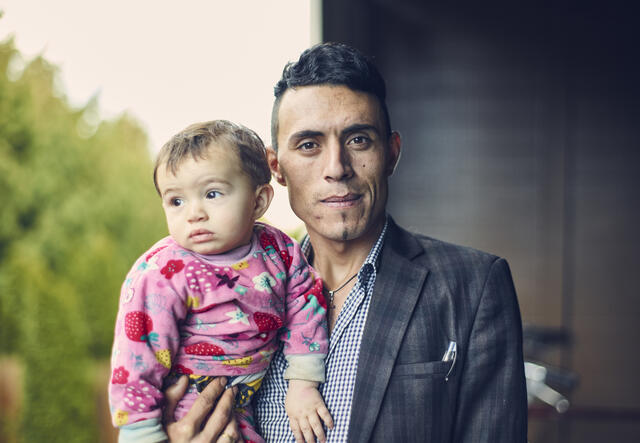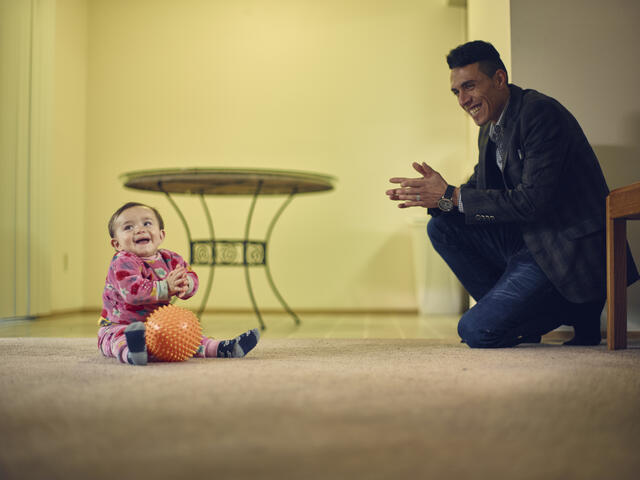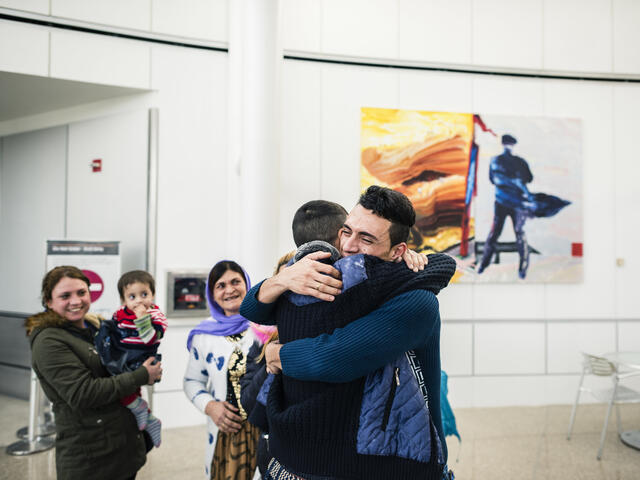
Update Feb. 10, 2017: Adil Nimr was reunited with the rest of his family at Sea-Tac International Airport on Friday, Feb 10. The International Rescue Committee is providing support to the newly arrived family members as they settle into their new home.
Little Steven, almost a year old, takes a few tentative steps in a sparse apartment in the suburbs of Seattle. His 26-year-old father, Adil Kheder Nimr, smiles at him lovingly and declares, “Steven is a symbol of America: freedom, opportunity, safety, and a chance at life.”
Adil and his wife, Shatha, arrived in the United States on Jan. 19, a day before President Trump’s inauguration and a week before his executive order banned Iraqi refugees, like Adil, from entering the U.S. Adil couldn’t fathom the edict: Why were Americans afraid of people like him? They were the ones escaping terror.
The Nimrs are Yazidis, an ethnically Kurdish people and one of Iraq’s oldest religious minorities, many of which have faced unspeakable atrocities at the hands of the terror group ISIS.
“I fled because of ISIS and terrorism,” says Adil, speaking through a friend serving as interpreter. “I thought America was a country where you aren’t judged by your religion or where you come from. I thought it was a place of openness.”
An appeals court lifted the travel ban targeting seven predominantly Muslim countries, allowing carefully vetted refugees—including thirteen members of Adil’s family who had been approved for resettlement. But their hopes for a family reunion may be dashed once more when the White House issues a second executive order on refugees in the coming days.
We will look back on our history and remember this as a wretched moment.
"We will look back on our history and remember this as a wretched moment, and particularly for the most vulnerable people seeking refuge—the majority of whom are women and children," says Nicky Smith, head of the IRC in Seattle.
Adil expresses his appreciation and respect for the administration wanting to protect Americans against terrorism, but stresses that he and his family were themselves victims of war and violence.
“You are targeting the wrong people,” he says, referring to Americans who espouse anti-immigrant rhetoric. “ISIS murders us. They chopped our heads, they did horrible things to our women, they killed children and destroyed our homes. They are still coming for us.”
Adil falls silent for a moment. He bows his head to cover his face and begins to cry.
“He’s heartbroken,” says his friend. “He’s heartbroken about his family.”

Mud, sickness, hunger
ISIS has driven tens of thousands of Iraqis from their homes, many of whom are members of religious minorities, including the Yazidi people in Sinjar, a mountainous region in northern Iraq .
Adil remembers waking to gunshots around 3am on Aug. 3, 2014. ISIS rounded up families, killing men and taking women and girls captive.
“We were terrified,” he says. “We couldn’t imagine that this was happening.”
Adil, along with his parents and siblings, were able to escape to Mount Sinjar, a craggy, mile-high ridge, where they found themselves stranded with 200,000 others for several days without enough food or water. It was unbearably hot. Adil worried that if ISIS didn’t kill him, dehydration would.
“We fled with nothing,” he says. “The worst was watching little kids trying to walk in the heat, dying of thirst.”
Adil survived the initial ordeal and eventually found refuge in a displacement camp near Duhok, a city in Iraqi Kurdistan. He describes his life in exile with three words: mud, sickness, hunger.
“We lived extremely hard,” he says. “In the winter, you cannot walk outside because of the mud on the ground. We had no power, no lights, no food. We didn’t get any support.”
One good thing happened, though. Adil met Shatha, and they married and had a child.
“Steven gave us hope,” Shatha says, who was also able to flee from ISIS. “He’s such a happy baby.”

Through all of this, the Nimrs pursued their refugee resettlement application, a process they had begun in 2011 when Adil’s father was receiving death threats for serving as a translator for the U.S. Adil raises both of his arms to mimic shooting: His father was almost killed by a sniper.
“It was a dangerous job, but he was happy doing it,” he says about his father, who worked with Americans for 10 years. “He is for democracy and freedom.”
The family had their first interview in 2013.
“It was a difficult process, but we remained patient,” says Adil. “We had nothing to hide. My father showed his patriotism to America.” One of his father’s American friends was named Steven.
Sitting now in his Seattle apartment, which the Nimrs secured with help from the International Rescue Committee, Adil contemplates his new life.
“I’m really happy Steven will grow up in America,” Adil says. “He will be educated and smart. There is no terrorism, no ISIS. He can live his life with freedom and a good future.”
Still, he longs to reunite with the rest of his family.
“Family means everything thing to me,” Adil says. “They complete me."
Thirteen of his relatives underwent the exhaustive security process, biometric scanning, medical screenings and cultural orientation. All that’s left is for America to greet them, as they had dreamed the country would.

"The Nimr family has given America so much, and they have lost everything. They hoped that that once they fled the horror and atrocity of war, they would be joined by their family members and they could rebuild their lives in a safe place without pain and suffering," says Nicky. "With this looming order, we have repaid their sacrifice by snatching away that hope."
Asked how he would feel once he's reunited with his family, Adil says: "I will dance on the streets with the American flag on top of my head and thank the Americans.”